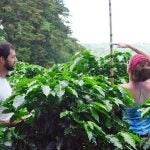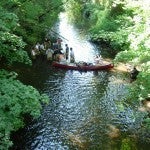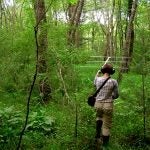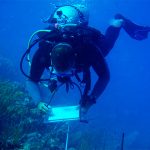Biological and Environmental Sciences
Ecology and Ecosystem Sciences
Research
Ecology of Managed Systems
Faculty: Alm, Amador, Brown, Couret, Gomez-Chiarri, Mather, Maynard, Meyerson, Moseman-Valtierra, Preisser
Specialization Coordinator: Scott R. McWilliams

Our research fosters sustainability in landscapes and seascapes managed by humans, including urban areas, recreational areas, and farms. We define ecological principles that underpin successful horticulture and aquaculture.
Some examples of ongoing research include:
- Understanding the outbreak of a new fungus species that is killing oak trees
- How the lyme disease pathogen is transmitted among tick vectors and vertebrate hosts
- How entomopathogens can control pests of turfgrass and ornamental plants
- How biological control can be used to safely control invasive species
- Development of propagation and management strategies for using native plants on roadsides and in urban landscapes
- How interactions between invasive species alter their environmental impact
Global Change Ecology
Faculty: Kolbe, McWilliams, Meyerson, Moseman-Valtierra, Paton, Preisser, Putnam, Puritz, Thornber
Specialization Coordinator: Graham Forrester

We are discovering how ecological systems respond to global climate change: the threat of emerging diseases, population growth, and the loss of biodiversity and ecosystem services. We examine these effects at all levels, from individuals to ecosystems.
Some examples of ongoing research include:
- Impacts of habitat loss on amphibian biodiversity
- How urbanization drives evolution in lizard populations
- How climate change influences bird migration
- The impact of ‘fear’ on predator-prey interactions
- How changes in nitrogen cycling alters wetland influence on the global climate
- Understanding the global spread of invasive species
Integrative Conservation Ecology
Faculty: August, Forrester, McWilliams, Meyerson, Paton, Wang
Specialization Coordinator: Graham Forrester

We are developing new solutions for the conservation of endangered species, and the long-term preservation of biodiversity and ecosystem function. These solutions include designing protected areas to preserve a particular species or ecosystem, assessing the risks of human activity and land uses on biodiversity, and developing management strategies for populations.
Some examples of ongoing research include:
- How we can mitigate impacts of wind farms on bird populations
- How coffee-dominated landscapes in Costa Rica, India, and East Africa support mammalian biodiversity
- How forest fragmentation affects rare wetland turtles
Marine Ecology
Faculty: Davies, Forrester, Gomez-Chiarri, Humphries, Moseman-Valtierra, Putnam, Puritz, Smith, Suckling, Thornber
Specialization Coordinator: Graham Forrester

We are developing new insights into ecological processes in marine and coastal habitats. Rhode Island’s “Ocean State” nickname is well deserved, and we take full advantage of the tremendous diversity of nearby marine and coastal habitats.
Some examples of ongoing research include:
- How food web dynamics are controlled in the intertidal zone
- How predator-prey interactions regulate fish populations on corals reefs
- Discovering microbial diversity in the deep sea
EES Specialization Group Coordinator, Professor
Department of Natural Resources Science
401.874.7531
srmcwilliams@uri.edu
